Key takeaways:
- Songwriting awards can significantly enhance an artist’s career, providing validation and new opportunities.
- Impactful lyrics are crucial for emotional connection with listeners, often transforming a song into a powerful narrative.
- Techniques for editing lyrics include reading aloud, seeking feedback, and refining vocabulary to enhance clarity and emotional depth.
- Crafting a unique lyrical voice involves embracing authenticity, taking risks, and developing personal storytelling techniques.

Understanding songwriting awards
Songwriting awards are more than just trophies; they represent recognition in a competitive and often subjective field. I remember the first time I submitted a song and felt that mixture of excitement and nerves. Has that ever happened to you? Hitting that “send” button can feel like standing on a precipice, wondering if your work will resonate with others.
These awards can significantly impact an artist’s career, opening doors to opportunities that might otherwise remain closed. I once attended an awards ceremony where I saw a fellow songwriter jump from local performances to national tours overnight. It’s fascinating how a single award can alter the trajectory of someone’s musical journey. Don’t you think the validation from peers and industry professionals can fuel a songwriter’s creative fire?
Moreover, the process of applying for these awards often pushes songwriters to refine their craft. I find that revisiting and reworking my lyrics to fit submission criteria can lead to unexpected revelations about my own songwriting style. Have you ever discovered something new about your artistry while preparing for a competition? It’s in that pursuit of excellence that we often find our most authentic voices.
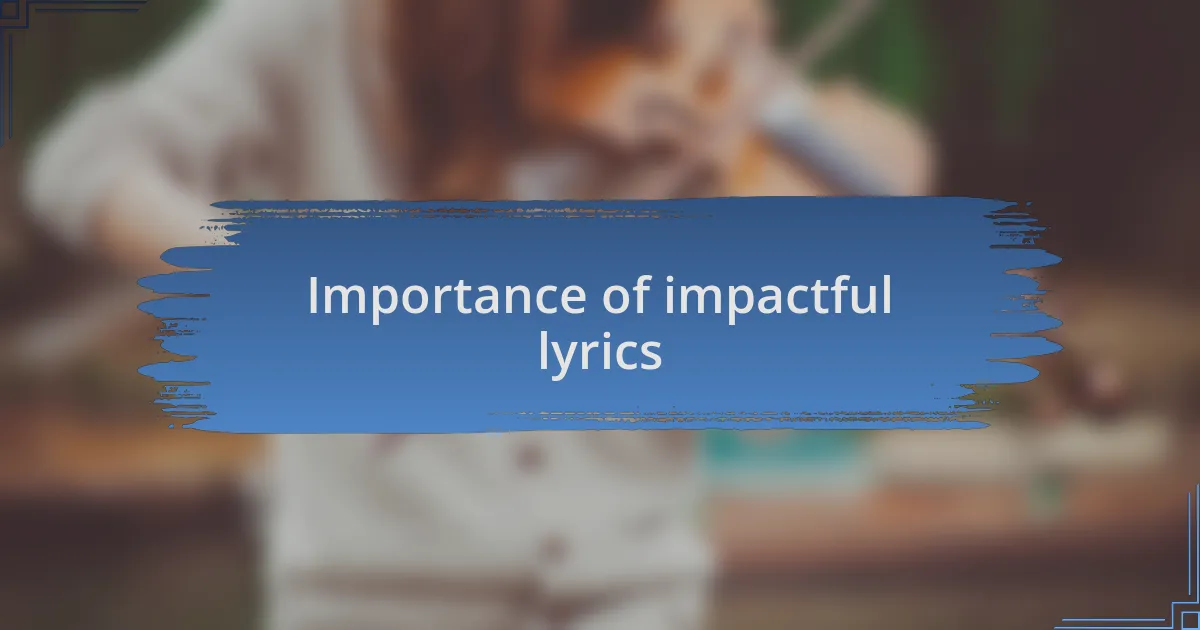
Importance of impactful lyrics
To truly connect with listeners, impactful lyrics are essential. I recall writing a chorus that struck at the heart of my personal experiences; the moment I played it for my friends, their reactions mirrored my emotions. It was as if the lyrics acted as a bridge between my soul and theirs. Can you think of a song that spoke to you so deeply that it changed the way you feel?
The beauty of impactful lyrics lies in their ability to evoke emotion and provoke thought. When I crafted a song about loss, I chose every word carefully, knowing that each line would resonate with someone who had experienced similar heartache. It’s this shared vulnerability that transforms a song from mere notes into a powerful narrative—don’t you love how music can create such a profound connection?
Additionally, impactful lyrics can elevate a song beyond just a catchy tune. I once experimented with imagery in my verses, and it transformed how listeners engaged with the song. They began to visualize the story I was telling, making it memorable and relatable. Isn’t it incredible how a well-placed metaphor can leave a lasting impression long after the music fades?
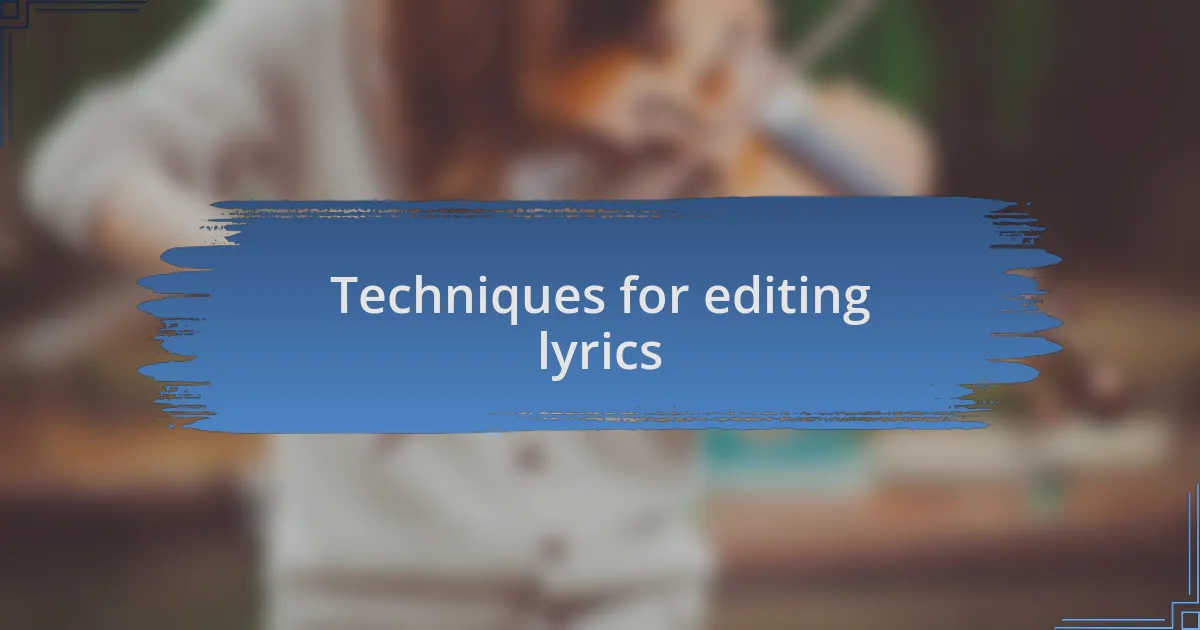
Techniques for editing lyrics
When it comes to editing lyrics, one technique I often use is reading them out loud. This allows me to hear the rhythm and flow, ensuring each line feels natural and impactful. I remember when I was refining a song about renewal; it wasn’t until I vocalized it that I realized one line felt clunky. Hearing it made all the difference, reinforcing my belief that our ears can sometimes catch what our eyes miss. Have you ever tried this?
Another approach I find invaluable is to seek feedback from other songwriters. I often share my drafts in a songwriting group, and their fresh perspectives can uncover hidden weaknesses in my lyrics. I once thought a line was perfect until a fellow writer suggested a simpler word that conveyed even deeper emotion. Their insight taught me the power of clarity—sometimes, less truly is more. Have you had similar experiences with critique?
I also challenge myself to push the boundaries of my vocabulary. When editing, I often ask if each word serves a purpose or reinforces the theme. For instance, I once swapped a few common phrases for more vivid imagery, and the transformation was astonishing; listeners reported feeling as if they were part of the story. Have you considered how a small change in diction can elevate a whole verse?

Analyzing award-winning songs
When analyzing award-winning songs, the common thread is often an emotional core that resonates deeply with listeners. I recall studying a hit ballad that swept several major awards; what struck me was how the chorus encapsulated universal feelings of love and loss in just a few powerful lines. This simplicity paired with emotional weight can transform a song into something unforgettable. Have you ever noticed how a well-crafted chorus can linger in your mind long after the song ends?
Another fascinating aspect is the contrast in lyrical structure. I once delved into a song that seamlessly shifted between detailed storytelling and abstract imagery, creating a dynamic experience. This interplay not only kept my attention but also evoked a range of emotions—from nostalgia to empowerment. This taught me the value of varying styles to enhance listener engagement. Have you experimented with different lyrical techniques in your own writing?
Moreover, the best lyrics often include relatable metaphors that paint vivid pictures. I recently analyzed a Grammy-winning track that opened with a striking metaphor about a sunset, instantly setting a poignant mood. This approach invites listeners to connect their own experiences to the song, making the lyrics feel personal. How do you feel when a song encapsulates your own emotions in a beautifully crafted metaphor?
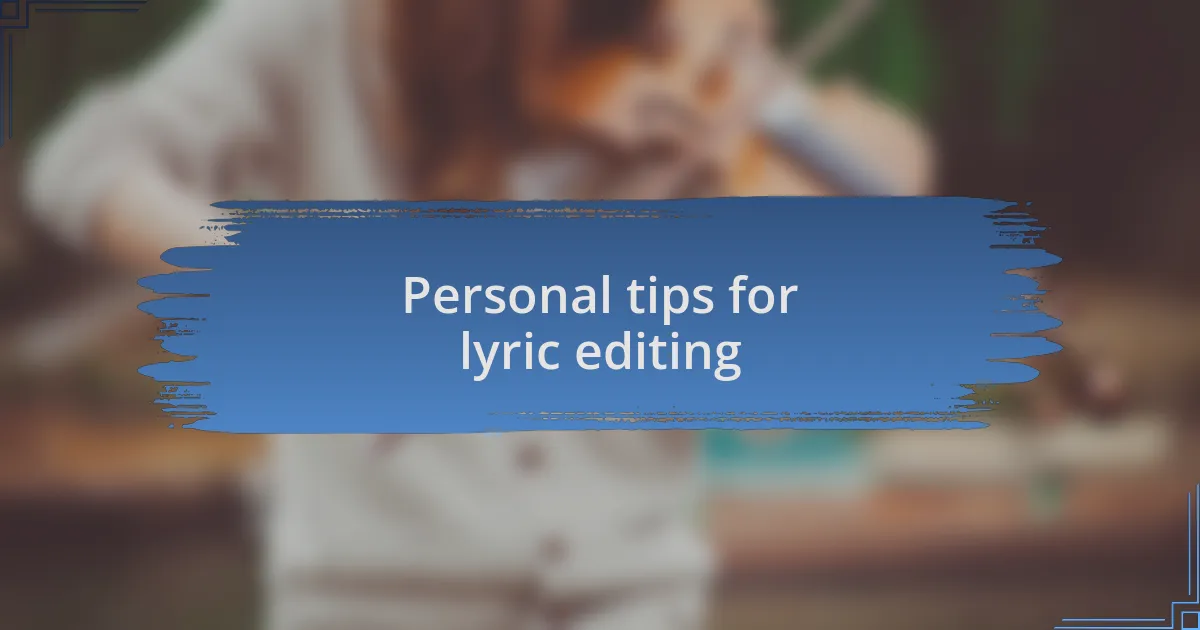
Personal tips for lyric editing
When I edit my lyrics, I focus on the power of brevity. I remember a time when I struggled with a verse that felt too cluttered. Cutting unnecessary words not only streamlined the message but heightened its emotional punch. Have you experienced that adrenaline rush when a lyric finally snaps into focus after a good edit?
Another technique I’ve found invaluable is seeking external feedback. I often share my drafts with trusted fellow songwriters who can spot awkward phrases or unclear imagery. Recently, a friend pointed out an inconsistency in a song of mine that I’d missed entirely. Their perspective helped me refine the lyrics, making them clearer and more compelling. How often do you collaborate with others to enhance your work?
Lastly, I embrace the revising process as a chance for transformation. There’s a song I wrote that went through multiple revisions, evolving from a simple idea to a complex narrative. Each edit brought me closer to articulating the emotions I wanted to convey. It’s a reminder that great lyrics often require patience and dedication. Have you ever felt that a piece of writing needed just one more edit to find its true potential?
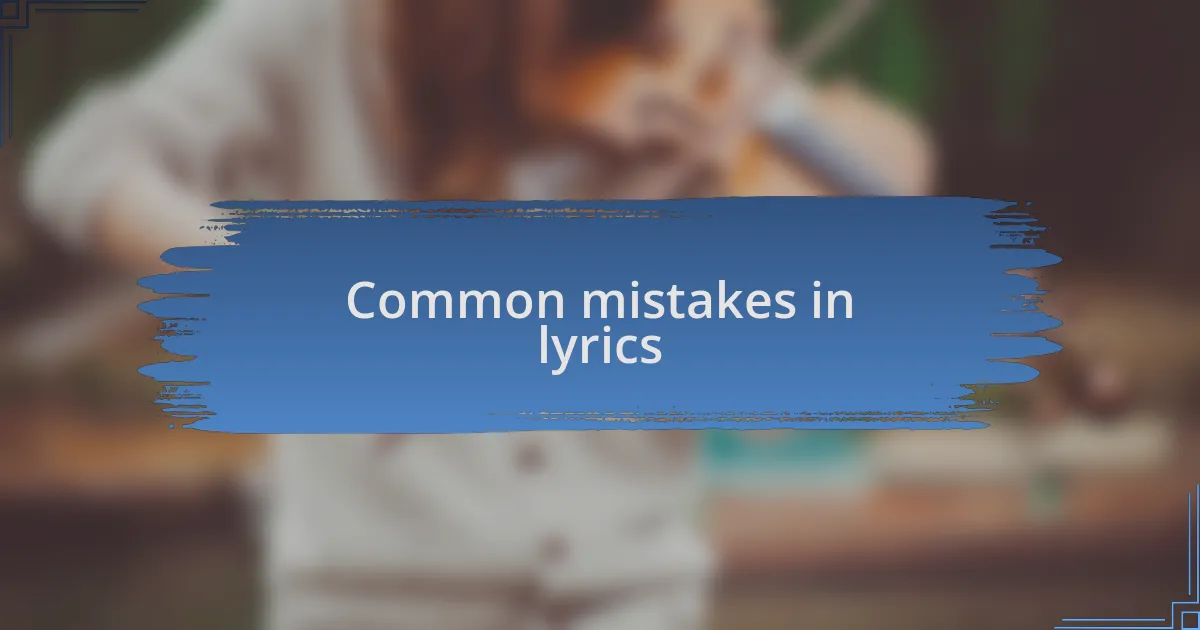
Common mistakes in lyrics
When it comes to common mistakes in lyrics, one that I’ve frequently encountered is the use of clichés. I recall writing a love song where I leaned too heavily on phrases like “love at first sight.” While they might feel comfortable, clichés can make your lyrics sound predictable and uninspired. Have you ever noticed how fresh, original lines truly resonate more with listeners?
Another pitfall involves insufficient rhythm or cadence in the lyrics. I once wrote a chorus that was lyrically strong but felt offbeat when sung. It was frustrating to realize that the emotional impact was lost simply because the flow didn’t match the melody. How often do we overlook the musicality of our words in pursuit of the perfect message?
Also, the tendency to over-explain can dilute the emotional connection. There was a time I wrote a narrative-heavy song that explained every detail of a painful breakup, thinking it would help the listener relate. Instead, it became overwhelming and detached. Sometimes, leaving things unsaid can invite listeners to fill in the gaps with their own experiences. Have you found that less can often be more when it comes to storytelling in your lyrics?
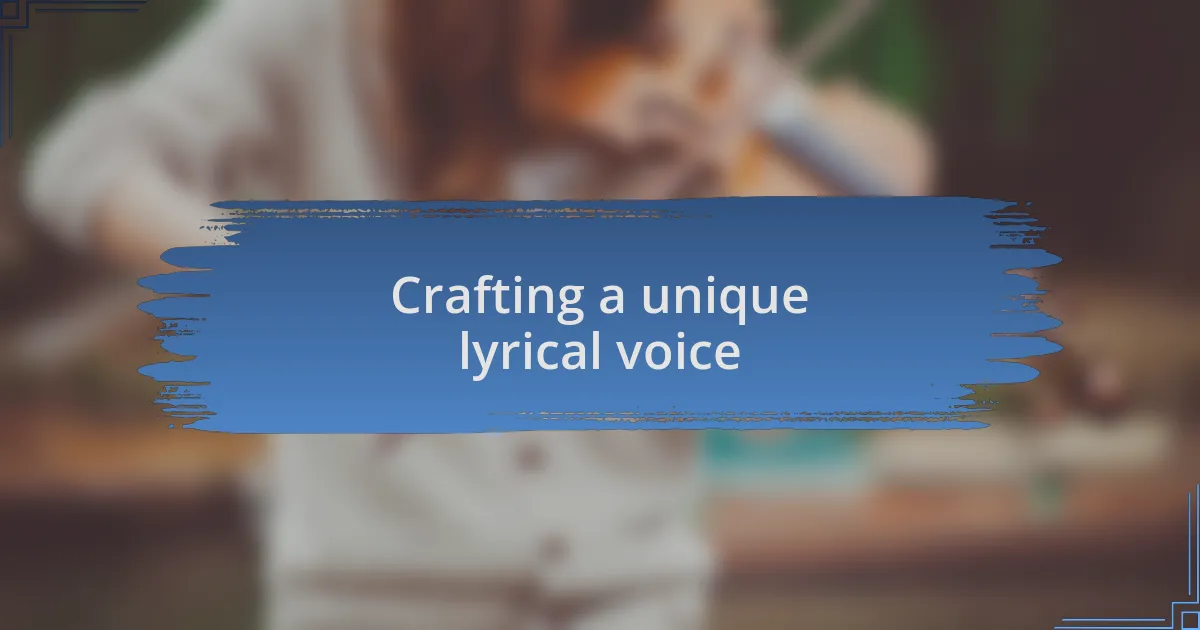
Crafting a unique lyrical voice
Crafting a unique lyrical voice is essential for standing out in the crowded music landscape. I remember the first time I wrote a song that felt distinctly “me.” It was a ballad filled with quirky comparisons and vivid imagery, such as likening heartbreak to a wilting sunflower. The moment I embraced my idiosyncrasies, I noticed how much more connected my audience felt to my stories—hasn’t that happened to you when you hear something so personal that it hits home?
Another crucial aspect of developing your lyrical voice is authenticity. I once tried to write from the perspective of a party-loving character, but it felt forced because that’s not who I am. When I shifted to writing from my own experiences of quiet introspection, it was like lifting a weight off my shoulders. Have you ever felt liberated by simply being true to yourself in your writing?
Ultimately, taking risks is what can make your lyrical voice distinct. I vividly recall writing a song that combined elements of humor and vulnerability. I was nervous to share it, fearing it wouldn’t resonate. To my surprise, listeners found it refreshing and relatable. Isn’t there something powerful about revealing your quirks, even if it feels like a leap into the unknown?